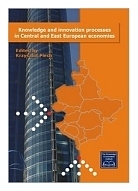|

KNOWLEGDE AND INNOVATION PROCESS
PIECH K. - IN CENTRAL AND EAST EUROPEAN ECONOMICS wydawnictwo: WIEDZA I INNOWACJA , rok wydania 2007, wydanie I cena netto: 32.50 Twoja cena 30,88 zł + 5% vat - dodaj do koszyka Knowledge and innovation processes in Central and East European economies
The aim of the book was to review recent research results in the sphere of knowledge
and innovation processes in Central and East European (CEE) economies, especially in
Visegrad countries (namely: the Czech Republic, Hungary, Slovakia and Poland).
The volume covers large parts of the issues which are connected with the knowledge
economy, as it what was called by OECD and the World Bank, namely with R&D,
innovations, innovation policy, education (incl. human capital), foresight, e-business
etc.
The key questions of the book were as follows:
do knowledge and innovation contribute to the development of CEE countries?
is the distance between (esp.) the V-4 countries and the EU growing or decreasing?
are knowledge and innovation priorities included in policy agenda in CEE as factors of
further economic growth?
do industries and companies appreciate benefits from knowledge and innovation activities
and draw more attention to them?
MAJOR FINDINGS of the book:
- Not only companies but also geography, institutions and policies determine growth and
competitiveness. The new EU member states should develop and coordinate policies related
to the knowledge economy.
- EU should play larger role in the coordination process, including also influence on
regional policies, because the policy-makers in CEE countries often concentrate on short-,
instead of long-term, problems.
- Knowledge and innovation priorities become more frequently included in policy agendas,
also on a regional level; nevertheless, in a number of cases they are limited to slogans
and the interests of sectoral or local lobbies often prevail.
- Policy-makers of CEE countries should concentrate more on creation of pro-innovative
working environment and cluster-oriented culture, based on trust and exchange of knowledge
and innovation, rather than on an increase of R&D expenditures only.
- There still lack sufficient measures of, e.g. knowledge economy or research policy
improvement. Therefore, the studies on research systems (and foresight processes) should
be intensified and the results included in development policies.
382 pages, Paperback
Księgarnia nie działa. Nie odpowiadamy na pytania i nie realizujemy zamówien. Do odwolania !.
|


